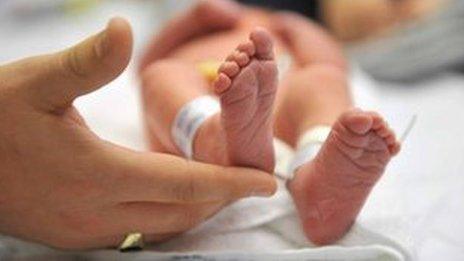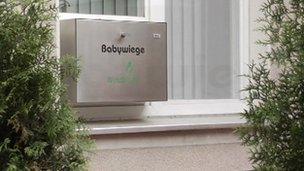Call for 'baby boxes' for abandoned newborns
- Published

As many as 50 babies are abandoned in the UK each year
Campaigners are calling for the introduction of "baby hatches" across the UK where desperate mothers can leave their babies in safety.
The call comes after a baby girl was found abandoned on a park bench in Edinburgh on Thursday.
Alley Lofthouse, who was herself was a foundling, said hospitals and medical units should be fitted with baby boxes like those used in Europe.
However, under current UK law it is illegal to abandon a child.
As many as 50 babies are abandoned in the UK each year, with some dying from cold or exposure before they are discovered.
'Secure and warm'
Ms Lofthouse, who runs the campaign group A Foundling, external, was abandoned on a doorstep in Grangemouth in 1967.
"I had no blanket, I was in a pillow case and I was literally hours old," she said.

An official baby box in Germany: the process of leaving your baby in the baby box is anonymous
"I had mild hypothermia. If I hadn't been found when I was, another hour or so and I would have been a statistic."
She said the baby hatches, built as a separate entrance in to a hospital or public building, would provide a secure way for mothers to leave babies safely and in secret.
"They are almost like an incubator in that they are heated and the mother can go in and put the baby in a secure and warm, padded incubator and close the door up," she said.
"It sets an alarm off, and on the other side a nurse or a clinician would come and take the baby away."
Baby hatches are widely used in European countries, since 1999 when they were first used in Germany.
Today there are around 100 of them in Germany, as well as in Austria, Belgium, Czech Republic, Hungary, Italy.
Abandoning a child is against the law across Europe, but some countries have introduced amendments to protect mothers who use a baby hatch.
In Hungary, for example, the law was changed so that leaving a baby in an official baby box was deemed to be a legal act amounting to consent to adoption, while dumping a child anywhere else remains a crime.
Ms Lofthouse says the UK law should also be updated to make the hatches legal.
"In many cases, the police stress when they are appealing for a mother to come forward that she's not in any trouble, but they want her to seek medical attention," she said.
"I guess the police also maybe realise that the law is outdated and that people who abandon their children have a real need and a desperate need to do something like this."
However, one of the arguments made by those who condemn the system is that it may be men who are giving the baby away.
The critics say that baby boxes may be used by unscrupulous fathers or even controllers of prostitutes to put pressure on mothers to dispose of an unwanted baby.
Psychologist Kevin Browne of Nottingham University previously told the BBC: "Studies in Hungary show that it's not necessarily mothers who place babies in these boxes - that it's relatives, pimps, step-fathers, fathers.
"Therefore, the big question is: are these baby boxes upholding women's rights, and has the mother of that child consented to the baby being placed in the baby box?"
Professor Browne continued: "The baby hatch is so anonymous, and so removed from the availability of counselling, that it creates a damage and a danger to the mother and child."
Encourage mothers
The UN Committee on the Rights of the Child, external, has also previously expressed concerns about the idea.
It says that baby boxes are a throwback to the past when the medieval church had what were called "foundling wheels" - round windows through which unwanted babies could be passed.
Critics have also raised concerns that the baby hatches may encourage more mothers to abandon their children.
But Ms Lofthouse says she does not believe that it would have any impact.
"I can't see anybody being encouraged to abandon a child," she said.
"You have to be at the end of a very long tether to be in a situation where you abandon a child."
- Published26 June 2012
- Published14 March 2013
- Published26 June 2012
- Published12 April 2013